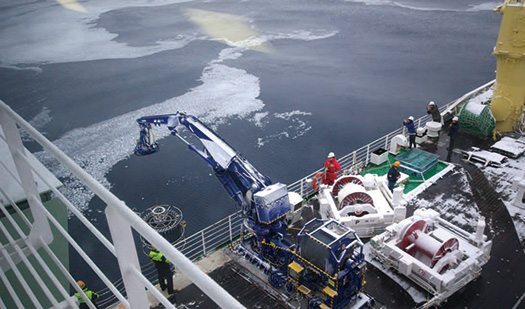Arctic Ocean Environment Research Group
Detecting the Current Status and Trend of the Arctic Environmental Change
The Arctic Ocean used to be covered by sea ice throughout the year, so it was a “quiet” ocean. Global warming causes substantial sea ice reduction, and the wider ocean area is exposed to atmosphere. Consequently, wind and solar radiation directly affects sea surface, producing the “more active” Arctic Ocean. Sea ice melting promotes various kinds of environmental changes such as ocean warming, freshening, and acidification.
There also appeared to be obvious changes in the Arctic land region. Earlier snowfall produces “blanket” for underlying ground. Then permafrost might thaw more easily. It may sound a little strange to say that early snow accumulation warms the ground, but this is a real phenomenon.
Now we find various rapid changes in the Arctic environment including marine ecosystem and carbon cycle. But it is still challenging to estimate exact magnitude of these changes and to clarify background mechanisms. Major goals of the Arctic Ocean Environment Research Group are detections of status and trend of the ongoing Arctic environmental changes for assessment of those impacts on global climate system.
We are conducting the Arctic Ocean expeditions by the research vessel (R/V) Mirai to measure ocean and atmospheric conditions, collecting samples of seawater and sediments. We also deploy mooring observation systems to collect year-long data under sea ice cover. Further, we obtain land surface data to examine changes in hydrological cycles etc. Numerical experiments using the Earth Simulator are also utilized for comprehensive understanding of environmental changes in the Arctic Ocean.
In recent years, sea ice reduction in summer has enabled the expanded operation by the R/V Mirai. We believe that accumulation of new data and findings will contribute to visualize the Arctic current status and future trends more clearly.

